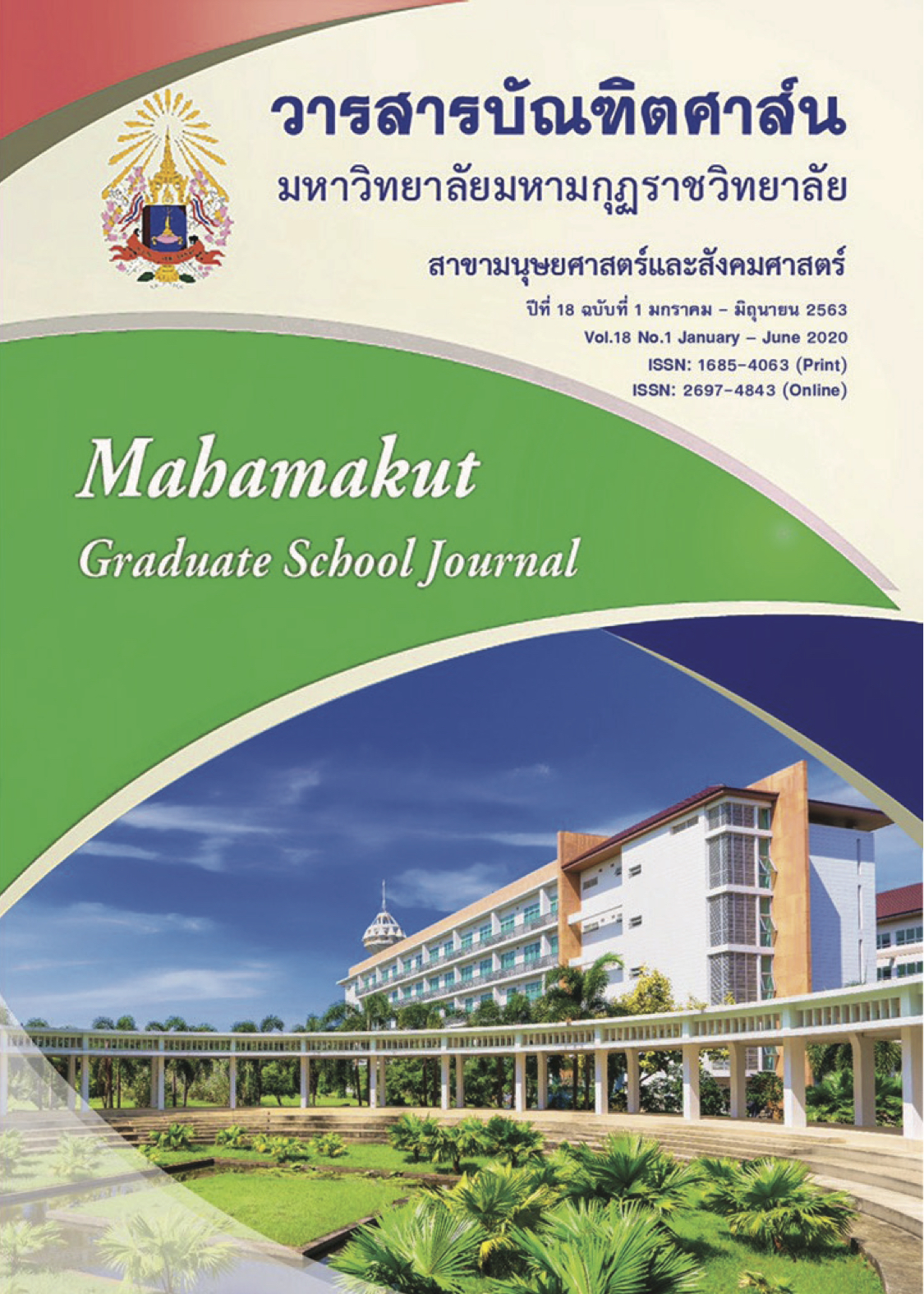ENHANCING THE CAPABILITY OF LECTURERS IN THE GRADUATE SCHOOL MAHAMAKUT BUDDHIST UNIVERSITY, SALAYA, PHUTTHAMONTHON DISTRICT, NAKHON PATHOM PROVINCE
Keywords:
Empowerment, Lecturer, Graduate School of Mahamakut Buddhist UniversitAbstract
The objectives of the study were as follows: 1. To study the empowerment of the lecturers in the Graduate School. 2. To provide guidance for increasing the capacity of faculty members in the Graduate School. Mahamakut Buddhist University. Research tools is a structured interview. The research was conducted with in-depth interviews with all lecturers. There is also group discussion.
The research found that the increase in the capacity of 5 full-time lecturers, Academic services to the society of research and production of texts. There are important problems in teaching. The lecturers are also poor in their use of modern media and modern technology. Course Improvement The lack of follow-up or evaluation of the curriculum thoroughly, resulting in the lack of curriculum updates or updates not meet the schedule. Academic Services The Faculty of Graduate Studies also lacked the support of course instructors for a clear service program.
There are no plans to work with the research community. Research published in TCI and international journals has not been published. Textbook production The Graduate School has no systematic promotion of textbooks. It is a concrete and lack of identity in the document.
The guideline and process of increasing the capacity of the lecturers in the Graduate School in teaching is that each subject must be supervised by the instructor. And to be aware of the policy of university administration in the same direction. Course Improvement Teachers play an important role and participate in curriculum improvement. There are improvement committees. Create your own curriculum standards. Academic service to society It should encourage the faculty to volunteer to attend seminars with organizations. Establishing a network in academic disciplines related to research is the university's faculty. The department must set up a budget to encourage the faculty to do research, mix and quality research. And research in Buddhism. Textbook production It should promote the lecturers in the field to compile into the teaching and books. Modern and integrated with modern science.
The new knowledge and academic value of the educational management are the teaching teachers must teach the course. In line with the improvement of curriculum, the curriculum lecturers participated in the improvement and development of the curriculum by incorporating the Buddhist principles of interactions with other modern sciences. Modify the course to suit current age. To develop a modern curriculum with current events in the 4.0 era, emphasizing the academic balance of Buddhism as a unique identity of the university. Academic service to society To provide academic services to the society in cooperation with external agencies. Local community District Administrative Organization Or nearby agencies around the university, research operations. Lecturers provide courses in both classroom and institutional research, as well as national or international research. The research policy planning can be used and integrated with the education linked to their own identity. The textbooks should be enough and modern, as well as supporting budget for publishing texts.
References
เจษฎา นกน้อย. (2554). แนวคิดการบริหารทรัพยากรมนุษย์ร่วมสมัย. กรุงเทพฯ : พิมพ์ครั้งที่ 2, จุฬาลงกรณ์มหาวิทยาลัย.
นงลักษณ์ ใจฉลาด, ดร. (2557). วารสารมนุษยศาสตร์และสังคมศาสตร์, บัณฑิตวิทยาลัย มหาวิทยาลัยราชภัฏพิบูลสงคราม ปีที่ 8 ฉบับที่ 2 กรกฎาคม–ธันวาคม.
ณรงควิทย แสนทอง. (2547). มารูจัก Competency กันเถอะ, กรุงเทพมหานคร : เอช อาร เซ็นเตอร.
ดนัย เทียนพุฒ. (2546). ความสามารถปัจจัยชนะของธุรกิจและคน. พิมพ์ครั้งที่ 1, กรุงเทพฯ : บริษัท นาโกต้า จำกัด.
ธำรงศักดิ์ คงคาสวัสดิ์. (2548). เริ่มต้นอย่างไร เมื่อจะนำ Competency มาใช้ในองค์กร, พิมพ์ครั้งที่ 1, กรุงเทพฯ : สมาคมส่งเสริมเทคโนโลยี (ไทย-ญี่ปุ่น).
ธํารงศักดิ์ คงคาสวัสดิ์. (2550). Competency ภาคปฏิบัติ เขาทํากันอยางไร. กรุงเทพมหานคร : พิมพ์ครั้งที่ 2,สมาคมสงเสริมเทคโนโลยี (ไทย-ญี่ปุน).
วัฒนา พัฒนพงศ์. (2547). ความรู้เบื้องต้นเกี่ยวกับการวัดการเพิ่มผลผลิตภาคบริการ, กรุงเทพฯ : สถาบันเพิ่มผลผลิตแห่งชาติ.
วีระวัฒน์ ปันนิตามัย. (2550). การพัฒนาโมเดลสมรรถนะเพื่อการบริหารจัดการทรัพยากรมนุษย์. การจัดการภาครัฐและเอกชน.
สุกัญญา รัศมีธรรมโชติ. (2549). แนวทางการพัฒนาศักยภาพมนุษย์ด้วย Competency. พิมพ์ครั้งที่ 3, กรุงเทพมหานคร : ศิริวัฒนาอินเตอรปริ้นท.
สำนักงานคณะกรรมการข้าราชการพลเรือน. (2551). การกำหนดและจำแนกตำแหน่ง. เอกสารบรรยาย.
สำนักงานคณะกรรมการข้าราชการพลเรือน. (2548). การปรับใช้สมรรถนะในการบริหารทรัพยากรมนุษย์. เอกสารประกอบการสัมมนา เรื่องสมรรถนะของข้าราชการ.
Downloads
Published
How to Cite
Issue
Section
License
บทความวิชาการและบทความวิจัยในวารสารฉบับนี้ถือเป็นความรับผิดชอบของผู้เขียนเท่านั้น บทความที่ได้รับการตีพิมพ์ในวารสารบัณฑิตศาส์น ถือเป็นลิขสิทธิ์ของมหาวิทยาลัยมหามกุฏราชวิทยาลัย ตามพระราชบัญญัติลิขสิทธิ์


